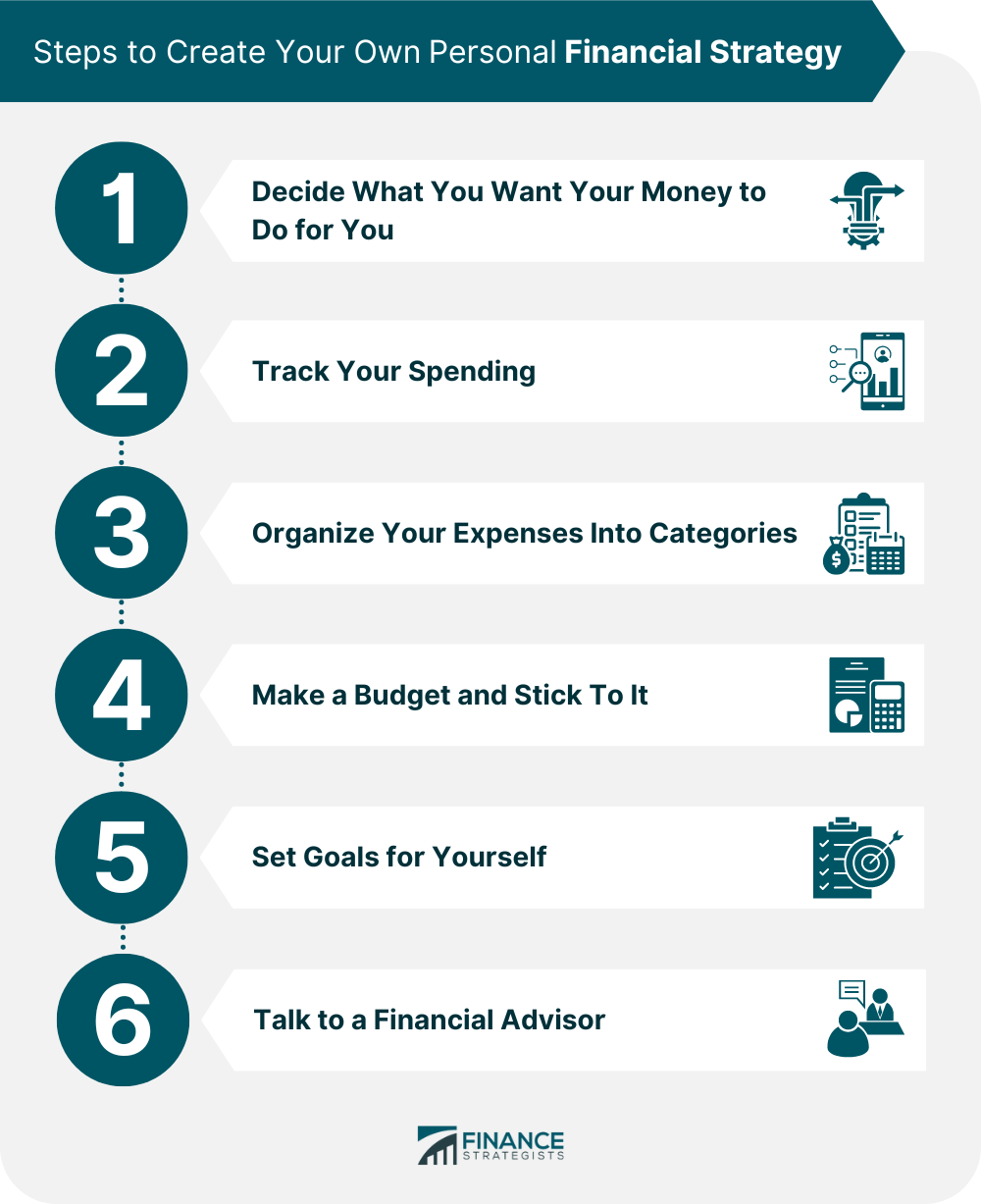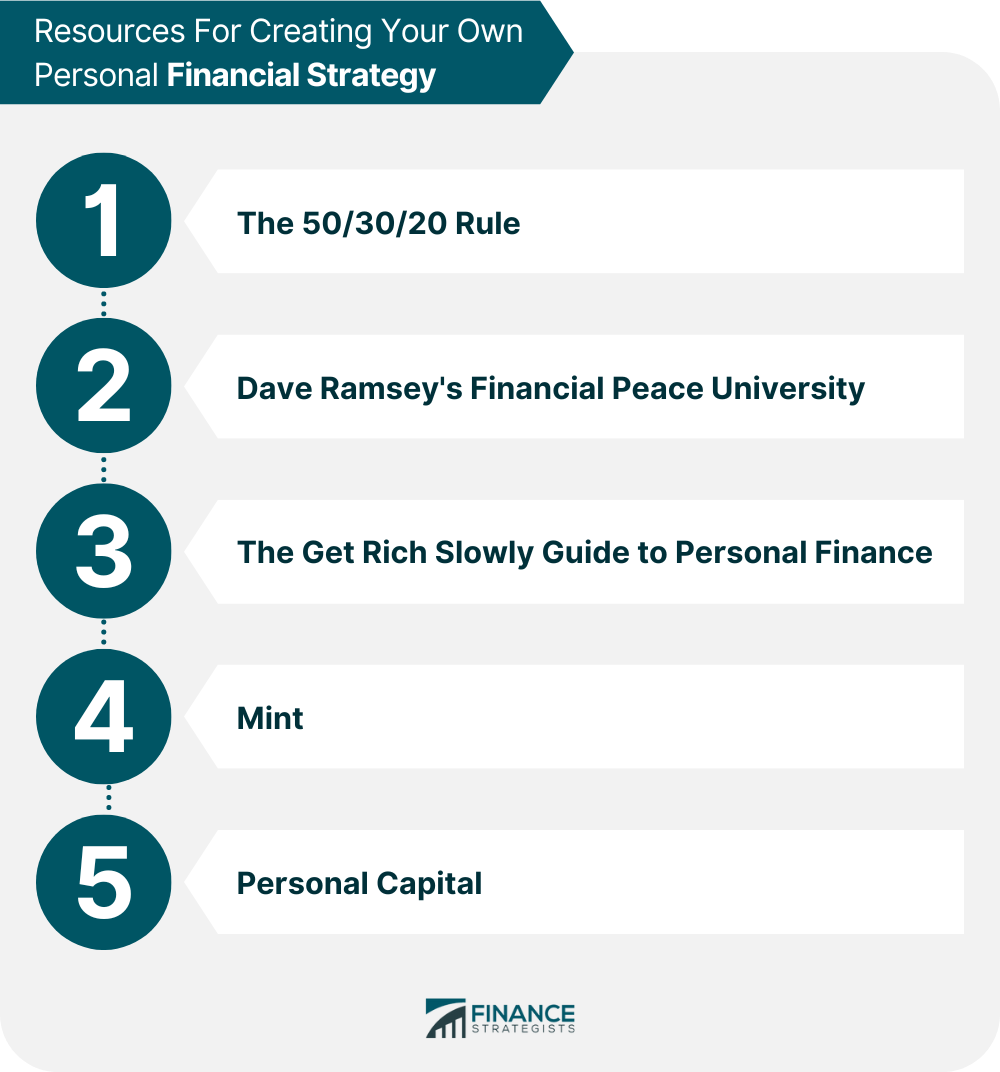A financial strategy is a clear path for what you are trying to achieve with your money. It can range from short-term goals like saving up enough for a new computer in the next three years, to lifetime goals like how much you would need to save up in order to retire at 65. It is also important to have a financial strategy because it can help you stay organized and make better financial decisions. Have questions creating a financial strategy? Click here. A financial strategy is beneficial because it will help you save more money in the long run. Having a plan for your money can also help you stay organized, instead of spending frivolously with no end goal in mind. When things are disorganized, it's easy to make poor financial decisions -- but when you have a plan in place, you are less likely to buy that shiny new phone just because it's the latest gadget. This means rather than spending money on things that will only add to your stress, like eating out all the time or buying clothes you never wear. You need to prioritize what is important in your life and spend money on those items rather than constantly spending it on more materialistic items that won't actually make you happy in the long run. Once you have decided what your priorities are, then you can start to save more because you will be able to see where all of your money is going. This way, you can identify if there are areas where you could save more money. This will help make it easier to see how much you are spending on each category, like rent, groceries, and transportation. Creating a budget is one of the most important aspects of having a financial strategy. It will help you make sure that you are not overspending in any one category and that you are saving up for things that are important to you. Make sure your goals are realistic, if they aren't, it will be less likely that you stick to them. Start with small steps toward reaching a larger goal and make sure to reward yourself when you reach smaller milestones along the way. If you are still struggling with creating a financial strategy that works for you, then talking to a financial advisor can be extremely helpful. They will be able to look at your specific situation and create a plan tailored just for you. Here are some suggestions that could start you off with your own financial strategy: A budgeting guideline suggests you spend 50% of your income on necessities, 30% of your income on discretionary spending, and 20% of your income on savings or debt payments. A nine-week course that helps participants create a budget and plan for their financial future. A comprehensive guide to personal finance, covering topics like budgeting, investing and reducing debt. A free online tool that helps you create a budget, track your expenses and see your bank account balances at a glance. A free online tool that helps you track your budget, plan for retirement and see your financial goals within minutes. There are many benefits to having a financial strategy in place, so it's worthwhile to create one for yourself. Even just spending 20 minutes on your finances every month can help you meet your goals and keep yourself financially accountable. Having a plan in place will also make it easier to save money, pay off debts, and reach other personal financial goals. After all, what is life without proper planning? Creating a financial strategy is beneficial to your personal finances, because it keeps you on track, helps you save more money, and makes reaching your goals easier. The first step toward creating any strategy is to set attainable goals for yourself. Then organize all of your expenses into categories so you can see where more of your money is going or what changes you can make to save. Finally, talk with a financial advisor if you are having trouble creating your plan or if you just need some extra help getting started. After all, it's better to be prepared than left in the dark! Why Do You Need One?
The Five Main Types of Financial Strategies
How to Create Your Own Personal Financial Strategy

Step 1. Decide what you want your money to do for you.
Step 2. Track your spending.
Step 3. Organize your expenses into categories.
Step 4. Make a budget and stick to it.
Step 5. Set goals for yourself.
Step 6. Talk to a financial advisor.
The Benefits Of Having A Financial Strategy In Place
Resources For Creating Your Own Personal Financial Strategy

The 50/30/20 Rule
Dave Ramsey's Financial Peace University
The Get Rich Slowly Guide to Personal Finance
Mint
Personal Capital
The Future of Money
The Bottom Line
Financial Strategy FAQs
A financial strategy is a plan that helps you organize and achieve your personal financial goals.
Some benefits of having a financial strategy are that it makes saving money easier, helps you make better financial decisions and prepares you for emergencies.
There are many different ways to create a personal financial strategy. One way is to use one of the many online resources that are available, like Mint or Personal Capital. Another way is to attend a financial planning class like Dave Ramsey's Financial Peace University.
No, absolutely not. Many personal financial strategies can be created without the help of a professional. However, it may be helpful to talk to a trusted family member or friend if you are looking for suggestions on how to get started.
Creating your own strategy will vary depending on how many goals you have and how much information you need to organize. However, it shouldn't take more than 20 minutes each month to stay on track.
True Tamplin is a published author, public speaker, CEO of UpDigital, and founder of Finance Strategists.
True is a Certified Educator in Personal Finance (CEPF®), author of The Handy Financial Ratios Guide, a member of the Society for Advancing Business Editing and Writing, contributes to his financial education site, Finance Strategists, and has spoken to various financial communities such as the CFA Institute, as well as university students like his Alma mater, Biola University, where he received a bachelor of science in business and data analytics.
To learn more about True, visit his personal website or view his author profiles on Amazon, Nasdaq and Forbes.















